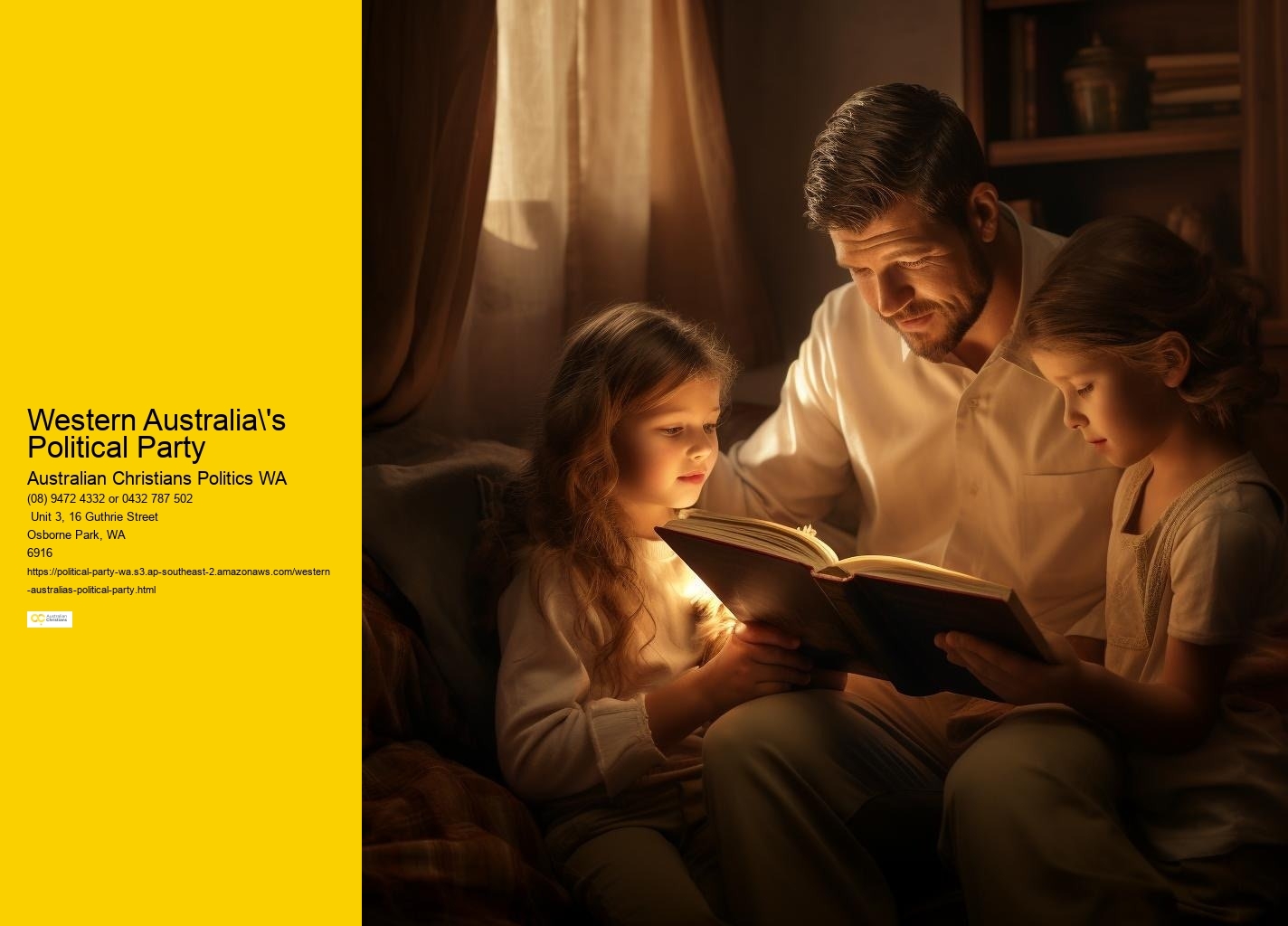

The Politics of Innovation in Western Australia The politics of innovation in Western Australia reflects the state's focus on fostering technological advancement and economic diversification. This involves policies and investments in areas such as digital infrastructure, research and development, and support for start-ups and tech industries. The state's approach to innovation is often a point of political discussion, balancing the need for economic growth with considerations of sustainability and social impact.
Political Economic Policies in WA The economic policies in Western Australia are crucial in shaping the state's economic health and growth. These policies cover areas such as taxation, industrial development, and trade. The state government’s approach to economic management is often influenced by global economic trends, local industry needs, and socio-economic objectives. Balancing these factors is key to ensuring sustainable economic development and prosperity in WA.
Diversity in Western Australia Political Parties Diversity in Western Australia's political parties is crucial for representing the state's heterogeneous population. This diversity, encompassing aspects such as ethnicity, gender, age, and socio-economic background, ensures that a wide range of perspectives and experiences are considered in the political process. Parties that embrace diversity are often more effective in understanding and addressing the multifaceted needs of their constituents, leading to more inclusive and equitable policy outcomes.
The Role of Political Satire in WA Political satire in Western Australia plays a unique role in the political discourse, offering a critical, often humorous perspective on politics and politicians. Through various media, satire provides an accessible way for the public to engage with political issues, often highlighting absurdities and hypocrisy in the political system. While it is a form of entertainment, political satire also serves as a tool for social commentary, influencing public opinion and holding leaders accountable.
In Western Australia, political groups vary from formal political parties to informal coalitions. These groups often represent specific community interests or ideological positions, contributing to a dynamic and pluralistic political culture in the state. Their engagement in political discourse adds depth and diversity to the policymaking process.
Political Engagement and Empowerment in WA Political engagement and empowerment in Western Australia are vital for a vibrant democracy. Efforts in this area focus on encouraging active participation from all segments of the population, including marginalised and underrepresented groups. This includes initiatives to educate the public on political processes, foster civic involvement, and ensure that diverse voices are heard in the political arena. Political empowerment is seen as key to building a more inclusive and responsive political system in WA.
Political Transparency and Open Government in WA Political transparency and open government in Western Australia are essential for building public trust and ensuring accountability. This involves clear communication of government actions, accessible public records, and mechanisms for public feedback and participation. WA’s political leaders are increasingly adopting digital tools and open data initiatives to enhance transparency. This openness is fundamental in fostering a more informed and engaged electorate and ensuring that government actions reflect public interests.
The Politics of Age and Generation in Western Australia The politics of age and generation in Western Australia reflect the diverse needs and perspectives of its population across different age groups. Younger generations tend to bring new issues to the political forefront, such as climate change and technological innovation, while older generations may focus on healthcare and retirement policies. Political parties in WA must navigate these varying priorities, striving to address the concerns of all age groups while fostering intergenerational understanding and cooperation.
The Political Dynamics of WA's Energy Sector The energy sector in Western Australia is a significant political area, given its impact on the economy and the environment. Political debates and policies in this sector focus on balancing the development of energy resources with environmental sustainability and energy security. The state's approach to energy policy has implications for its economic growth and commitment to reducing carbon emissions.
The Economics of Politics in Western Australia The economics of politics in Western Australia are deeply influenced by the state's resource-rich economy. Political decisions often revolve around managing these resources sustainably while fostering economic diversification and growth. Economic policies in WA are thus a critical area of political focus, with significant implications for employment, investment, and overall economic wellbeing of the state.
Political Representation in Western Australia’s Parliament Political representation in Western Australia's Parliament is designed to reflect the diverse makeup of the state’s population. The electoral system, comprising both single-member and proportional representation, ensures that both the majority and minority viewpoints are considered in the legislature. This representation is crucial for a balanced and fair governance system, allowing for a wide range of voices and interests to be heard in the decision-making process.
Western Australia’s Political Stability and Security Political stability and security in Western Australia are foundational to the state's prosperity and quality of life. The state's political environment is characterised by a stable democratic system, effective governance, and the rule of law, which together ensure a secure and predictable political climate. This stability attracts investment and facilitates economic growth, contributing to WA's overall development. Maintaining this stability and security remains a key focus of the state's political leadership.
Western Australia's Political Engagement with Asia-Pacific Western Australia's political engagement with the Asia-Pacific region is crucial, given its strategic location and economic interests. This engagement involves diplomatic initiatives, trade agreements, and cultural exchanges. WA’s approach to Asia-Pacific relations is guided by both economic objectives and the goal of fostering regional stability and cooperation.
Current Political Parties in Western Australia
Ideological Shifts in Western Australia Politics Over the years, Western Australia has witnessed significant ideological shifts in its political landscape. These shifts reflect changing social values, economic conditions, and global influences. From the dominance of resource-based economic policies to a growing emphasis on environmental sustainability and social justice, the political ideologies in WA continue to evolve. These changes not only influence party politics and electoral outcomes but also shape the broader policy directions of the state.
Political Party Alliances in Western Australia Political party alliances in Western Australia are formed for various strategic reasons, including gaining legislative power, advancing shared policy goals, or responding to specific political challenges. These alliances, which can be formal or informal, impact the state's political dynamics and legislative processes. They can lead to more collaborative governance but also present challenges in terms of maintaining party identity and coherence.
Key Political Figures Shaping WA Politics Key political figures in Western Australia play a pivotal role in shaping the state's political narrative. These individuals, whether they are party leaders, influential legislators, or political activists, wield significant influence over policy decisions and public opinion. Their leadership styles, political philosophies, and personal charisma can significantly impact the direction and outcomes of political processes in the state.
WA's Political Party Ideologies The ideologies of WA's political parties form the foundation of their policies and actions. These ideologies, ranging from conservative to progressive, shape the parties' perspectives on issues such as economic management, social welfare, environmental protection, and education. Understanding these ideologies is crucial for voters, as it helps them align their choices with their own beliefs and expectations for the state's future.
The Political Debate on WA’s Taxation Policies Taxation policies in Western Australia are a focal point of political debate, impacting the state's economic management and public services. Political parties and leaders discuss various approaches to taxation, considering factors such as fairness, economic growth, and fiscal responsibility. These debates reflect the complex challenge of balancing revenue generation with economic stimulation.
Western Australia's Defence Policy Overview Western Australia's defence policy plays a critical role in both the state’s and the nation’s security strategy. The policy outlines WA’s contribution to national defence, including support for defence installations, industry participation, and regional security initiatives. As a strategic location in the Indian Ocean region, WA's defence policy is also linked to broader geopolitical considerations and Australia's international defence partnerships.
Western Australia's Electoral Reforms Debate The debate over electoral reforms in Western Australia reflects the ongoing efforts to improve the state’s democratic processes. Discussions focus on issues such as voting methods, electoral boundaries, and campaign financing. These reforms are aimed at enhancing fairness, transparency, and representation in elections, ensuring that the electoral system accurately reflects the will of the people.


Political Party Western Australia
WA's Political Response to Global Challenges Western Australia's political response to global challenges, such as climate change, economic instability, and international conflicts, is shaped by its geopolitical position and economic interests. The state’s leaders and policymakers assess and respond to these challenges with strategies that protect WA's interests while contributing to global solutions. This involves balancing local priorities with broader international responsibilities.
Western Australia's Electoral System and Political Parties Western Australia's electoral system plays a significant role in shaping the state's political parties. The system, which includes both proportional and preferential voting, impacts how parties strategise, form coalitions, and engage with voters. This system encourages a competitive and diverse political environment, allowing for a variety of voices to be heard and represented. The interaction between the electoral system and political parties is key to understanding the dynamics of political power and representation in WA.
The Role of Social Media in WA Political Parties The role of social media in WA's political parties has become increasingly important. Social media platforms are used for communication, campaigning, and engaging with a broader audience. They provide a space for direct interaction with constituents, real-time feedback, and the dissemination of party messages. The effective use of social media can enhance a party's visibility and influence, especially among younger demographics. However, it also presents challenges in terms of managing online discourse and misinformation.
Election Strategies of Western Australia's Parties Election strategies of Western Australia's parties are carefully crafted to maximise their appeal to voters. These strategies encompass policy announcements, campaign messaging, candidate selection, and voter engagement efforts. Effective election strategies are those that resonate with the electorate's concerns and aspirations, demonstrating the party's understanding and responsiveness to the needs of Western Australians.
Western Australia's Party System Explained Western Australia's party system is a multifaceted structure that accommodates a variety of political ideologies and interests. The system is characterised by a mix of major national parties and smaller state-focused parties, each vying for influence in both state and federal politics. This system allows for a broad representation of views and ensures that a range of perspectives is considered in the political process. The interactions and power dynamics among these parties play a crucial role in shaping the state's legislative and policy outcomes.
Strategies for Political Mobilisation in WA Political mobilisation strategies in Western Australia are employed by parties and advocacy groups to engage and activate the electorate. These strategies, which include grassroots campaigning, digital outreach, and public rallies, are crucial for raising awareness about political issues and encouraging public participation in the democratic process. Effective mobilisation can significantly influence election outcomes and policy debates in WA.
WA Political Organisations
Western Australia’s Party-Led Initiatives Party-led initiatives in Western Australia often reflect the parties' core values and policy priorities. These initiatives can be in various sectors such as infrastructure development, social welfare programs, or environmental conservation efforts. The success of these initiatives plays a significant role in shaping the parties' public image and their ability to effect positive change in the state.
Political Decision-Making Processes in WA The decision-making processes in WA's politics are structured to ensure a balance of power and representation. Decisions are typically made through a combination of parliamentary debates, committee discussions, and consultations with stakeholders. This process is designed to be thorough and inclusive, allowing for various viewpoints to be considered. However, it can also be complex and time-consuming, reflecting the challenges of balancing efficiency with democratic participation.
WA's Political Stance on Education Reform Education reform is a significant political issue in Western Australia, with parties and leaders proposing various strategies to improve the education system. These reforms often focus on issues such as funding, curriculum development, teacher training, and educational equality. The stance of WA’s political leaders on education reform reflects their commitment to ensuring that all citizens have access to quality education, which is crucial for the state's long-term social and economic development.
Political Consensus Building in Western Australia Consensus building in Western Australian politics is crucial, especially on issues that transcend partisan lines. Political leaders and parties often work towards consensus on matters of public interest, such as environmental protection and regional development. This process involves negotiations and compromises, reflecting the complexities of representing a diverse electorate while striving for policies that benefit the broader community.
Political Party Reforms in WA Political party reforms in WA are essential for ensuring the health and integrity of the state's democratic process. These reforms may include changes in party governance, campaign financing, and candidate selection processes. The aim of such reforms is to increase transparency, accountability, and inclusiveness within parties, thus enhancing public trust and participation in the political process. Ongoing reforms are necessary to adapt to new challenges and maintain a vibrant and responsive political system.
Political Groups Western Australia
The Politics of Art and Culture in Western Australia Art and culture hold a special place in Western Australia’s politics, reflecting the state's rich heritage and diverse population. Political support for the arts includes funding for cultural institutions, support for local artists, and promotion of cultural events. Debates in this area often centre around the balance between cultural preservation and innovation, as well as the role of art and culture in fostering community identity and social cohesion.
The Evolution of Political Parties in WA The evolution of political parties in Western Australia reflects the changing social, economic, and cultural landscapes of the state. Over time, these parties have adapted their policies and strategies to meet the evolving needs and expectations of their constituents. From the early days of federation to the current era, WA's political parties have seen shifts in ideologies, leadership, and organisational structures, reflecting broader trends in Australian and global politics. This evolution is a testament to the dynamic nature of political life in WA, with parties continually evolving to remain relevant and effective.
Western Australia’s Political Party Fundraising Strategies Fundraising strategies of political parties in Western Australia are essential for supporting their operations and election campaigns. These strategies include events, donor outreach, and membership drives. Political parties must navigate the legal and ethical aspects of fundraising, ensuring transparency and compliance with electoral laws. Effective fundraising is crucial for party viability and competitiveness in elections.
WA Political Party List
WA's Political Decision Making: Processes and Outcomes The decision-making processes in Western Australia's politics are characterised by deliberation, consultation, and sometimes contention. These processes involve various stakeholders, including government agencies, political parties, and the public. The outcomes of these decisions are crucial in shaping the state's future, impacting everything from economic policies to social programs.
Environmental Stances of WA Political Parties The environmental stances of WA's political parties are increasingly important in an era of climate change and ecological awareness. These stances include policies on sustainable development, conservation efforts, and responses to climate change. The parties' commitment to environmental issues is closely watched by the electorate, particularly by younger voters, and significantly influences public support and trust.


Emerging Political Parties WA Emerging political parties in WA reflect the dynamic and ever-changing nature of the state's political landscape. These new parties often emerge in response to specific societal needs or issues that are perceived as being inadequately addressed by the existing major parties. They bring new ideas and perspectives to the political discourse, challenging traditional approaches and offering innovative solutions to the state's challenges.
Political Parties' Approach to WA's Housing Crisis The housing crisis in Western Australia is a significant political issue, with parties proposing various solutions to address affordability and availability. These approaches include policy reforms, housing development initiatives, and support for vulnerable populations. The politics surrounding the housing crisis are complex, reflecting the challenges of urban planning, economic factors, and social policy.
The Political Landscape of WA's Technology Sector The technology sector in Western Australia is increasingly influential in the state’s political landscape. Political leaders and parties focus on policies that support technological innovation, digital infrastructure, and the tech industry's growth. The sector's development is seen as key to diversifying the state's economy and creating new opportunities, particularly in areas like mining technology, renewable energy, and digital services.
Political Leadership Styles in WA The leadership styles of political figures in Western Australia vary, reflecting the diverse nature of its political landscape. These styles range from collaborative and consensus-building to more authoritative and directive approaches. Leadership in WA politics involves navigating the state's unique challenges, including its vast geographical spread and varied economic interests. The effectiveness of different leadership styles can significantly influence political outcomes and public support.
The Economic Policies of Western Australia's Parties The economic policies of Western Australia’s political parties play a pivotal role in shaping the state's economic landscape. These policies address a range of issues including taxation, job creation, business development, and fiscal management. The effectiveness of these economic policies is a key factor in determining the parties' popularity and influence, as they directly impact the livelihoods and well-being of WA’s citizens.
Western Australia's Political Strategy and Vision Western Australia's political strategy and vision are centered on leveraging its natural resources, promoting innovation, and ensuring sustainable development. Political leaders in WA focus on creating policies that balance economic growth with social and environmental responsibilities. The state's vision includes not only economic prosperity but also the wellbeing of its communities and the preservation of its natural heritage.
The Role of Unions in WA Political Parties Unions play a significant role in WA's political parties, particularly those with a focus on workers' rights and social justice. Unions often influence party policies related to labour rights, wages, and workplace safety. Their support can be crucial for parties, providing both a base of support and resources for campaigning and policy development.
Western Australia's Political Party Challenges Political parties in Western Australia face a range of challenges, from changing voter demographics to evolving political landscapes. These challenges include adapting to new technologies, addressing the diverse needs of a growing population, and responding to global economic and environmental trends. Overcoming these challenges requires innovative strategies, strong leadership, and an ability to stay connected with the public's changing attitudes and expectations.
Political Ethics and Leadership in WA Political ethics and leadership in Western Australia are essential for ensuring public trust and effective governance. Ethical leadership involves transparency, accountability, and integrity in decision-making processes. WA's political leaders are expected to uphold high ethical standards and serve as role models in public life, ensuring that the state's governance is conducted with honesty and respect for the rule of law.
The Rise of New Political Parties in WA The emergence of new political parties in Western Australia reflects the evolving needs and perspectives of its populace. These parties often arise from grassroots movements or as breakaways from established parties, bringing fresh ideas and alternative approaches to the political arena. Their rise is indicative of the changing political sentiments in the state and can significantly alter the political landscape, challenging the status quo and introducing new dynamics into the electoral process.
WA's Political Institutions: An In-depth Study An in-depth study of Western Australia's political institutions reveals a complex system designed to balance representation, accountability, and efficiency. These institutions, including the Parliament, the Executive, and the Judiciary, function within a framework of checks and balances. Understanding the roles and interactions of these institutions is essential for appreciating the nuances of WA’s governance and political processes.
The Impact of Political Rhetoric on WA’s Public Policy Political rhetoric in Western Australia plays a pivotal role in shaping public policy. The way political leaders and parties communicate their ideas and positions can significantly influence public opinion and policy debates. Effective rhetoric can bring attention to specific issues, galvanise public support, and facilitate policy changes, while divisive or misleading rhetoric may hinder policy development and erode public trust.
WA's Political Landscape: A Comparative Analysis Western Australia's political landscape, when compared with other Australian states and territories, reveals unique characteristics influenced by its geographical, economic, and social makeup. WA’s vast mineral resources, large geographic size, and regional diversity shape its political priorities and debates. Understanding these nuances is essential for a comprehensive analysis of how WA's political landscape differs from and interacts with broader national politics.
The Politics of Sport in Western Australia Sport plays a unique role in Western Australia’s politics, not only as a matter of public interest but also in terms of economic impact and community development. Political discussions around sport include funding for sports facilities, support for professional and amateur sports, and the use of sports as a tool for social cohesion and public health. The state's investment in sports is often seen as a reflection of its commitment to healthy lifestyles and community wellbeing.

Political parties in Western Australia play a crucial role in the democratic process, representing different ideologies and policy positions., "political parties Western Australia, role of political parties",Role of Political Parties in Western Australia,Role of Political Parties in Western Australia
Political parties influence local government in Western Australia by endorsing candidates and shaping local policies., "political party influence, local government Western Australia",Influence of Political Parties on Local Government in Western Australia,Influence of Political Parties on Local Government in Western Australia
The major political parties in Western Australia include the Australian Labor Party, the Liberal Party, and the Greens., "major political parties Western Australia, Australian political parties",Major Political Parties in Western Australia,Major Political Parties in Western Australia
Political parties in Western Australia engage with the community through public meetings, social media, and community events., "political party community engagement, Western Australia politics",Community Engagement of Political Parties in Western Australia,Community Engagement of Political Parties in Western Australia
Political parties significantly impact state legislation in Western Australia by proposing bills and influencing law-making., "political party state legislation, Western Australia law",Impact of Political Parties on State Legislation in Western Australia,Impact of Political Parties on State Legislation in Western Australia
Political parties in Western Australia fund their campaigns through donations, fundraising events, and government funding., "political party funding, Western Australia election",Funding of Political Parties in Western Australia",Funding of Political Parties in Western Australia
The history of political parties in Western Australia dates back to the late 19th century, reflecting the state's evolving political landscape., "history political parties, Western Australia politics",History of Political Parties in Western Australia,History of Political Parties in Western Australia
Political parties in Western Australia shape public opinion through media campaigns, policy announcements, and public debates., "political party public opinion, Western Australia politics",Shaping of Public Opinion by Political Parties in Western Australia,Shaping of Public Opinion by Political Parties in Western Australia
Political parties in Western Australia face challenges such as changing voter demographics, fundraising, and maintaining relevance., "challenges political parties, Western Australia politics",Challenges Faced by Political Parties in Western Australia,Challenges Faced by Political Parties in Western Australia